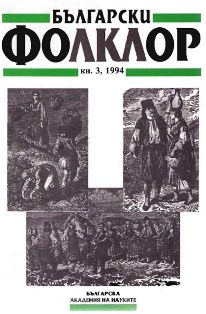Към въпроса за названието на празника Лазаруване
On the Origin and the Meaning of the Name “Lazaruvane” (St Lazar’s Day Rite)
Author(s): Yosif MorozSubject(s): Anthropology
Published by: Институт за етнология и фолклористика с Етнографски музей при БАН
Summary/Abstract: The article is devoted to the analysis of the functional and semantic links between the “Lazaruvane” spring maiden folk rite and its name. In the works preceding this article, the authors only note that the name “lazarki” (St Lazar’s day girls) comes from the name of Saint Lazar. Here the author examines the structure of the ritual itself, the functions of some of the acting characters in it, as well as their semantics. Studied in the first place are the ritual roles of the “kum” and the “boenetz”. The author reveals direct semantic parallels in the figures of little Lazar and his sisters, appearing in the St Lazar’s day ritual songs, and of St. Lazar and his two sisters from the New Testament parable. Furthermore, the author suggests that both subjects (the biblical and ritual one) follow the same prototype. They lead their origin from the myth of the vegetative male god and the pair of goddesses, symbolizing the two basic seasons – of starvation and fertility, – their everlasting mutual succession in the cosmic order.
Journal: Български фолклор
- Issue Year: XX/1994
- Issue No: 3
- Page Range: 61-70
- Page Count: 10
- Language: Bulgarian
- Content File-PDF

